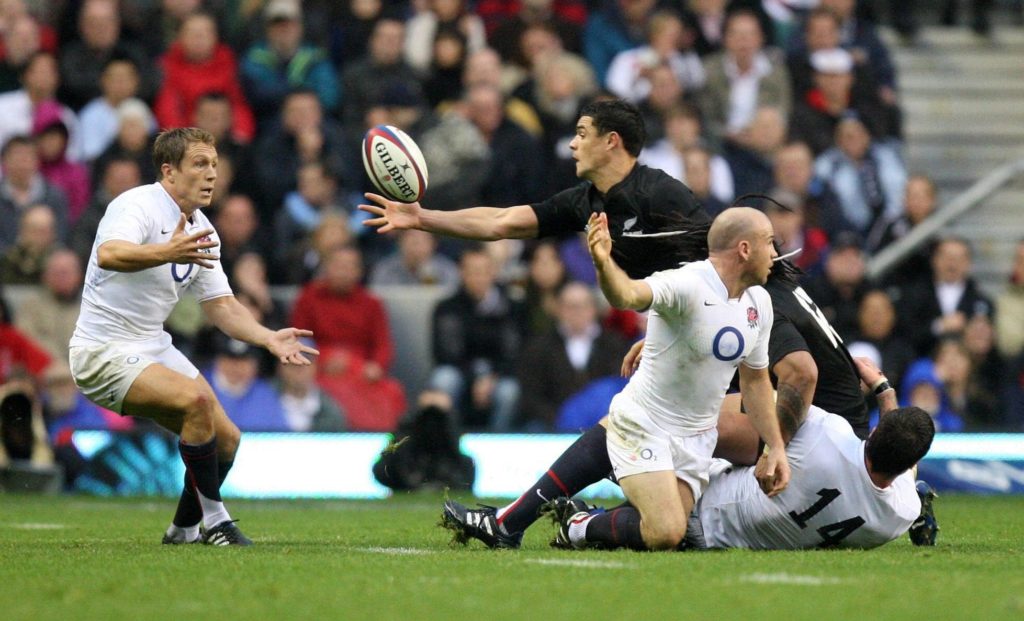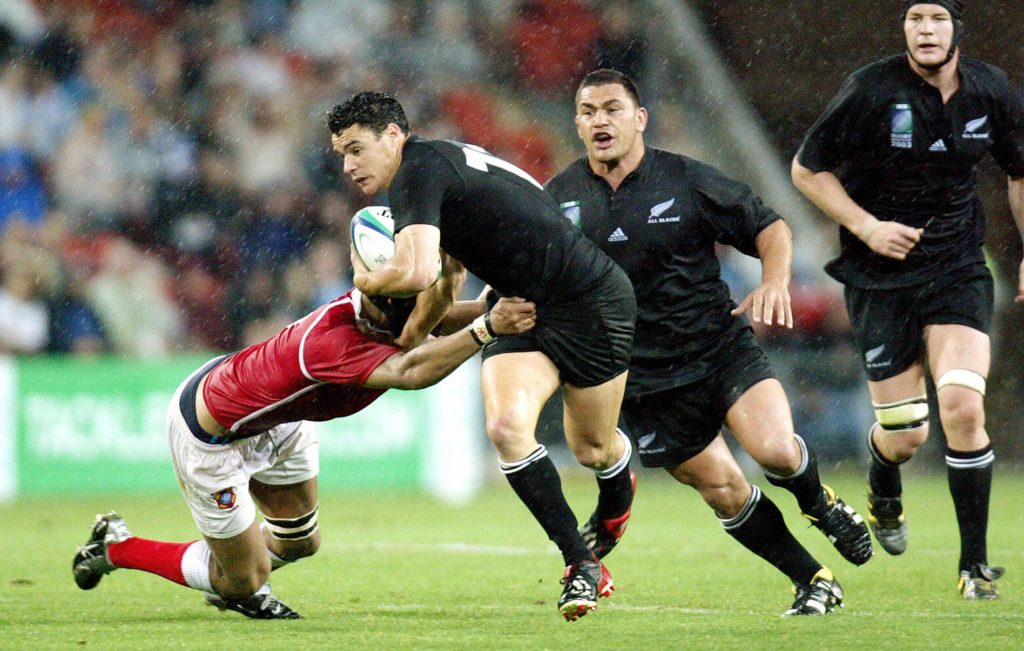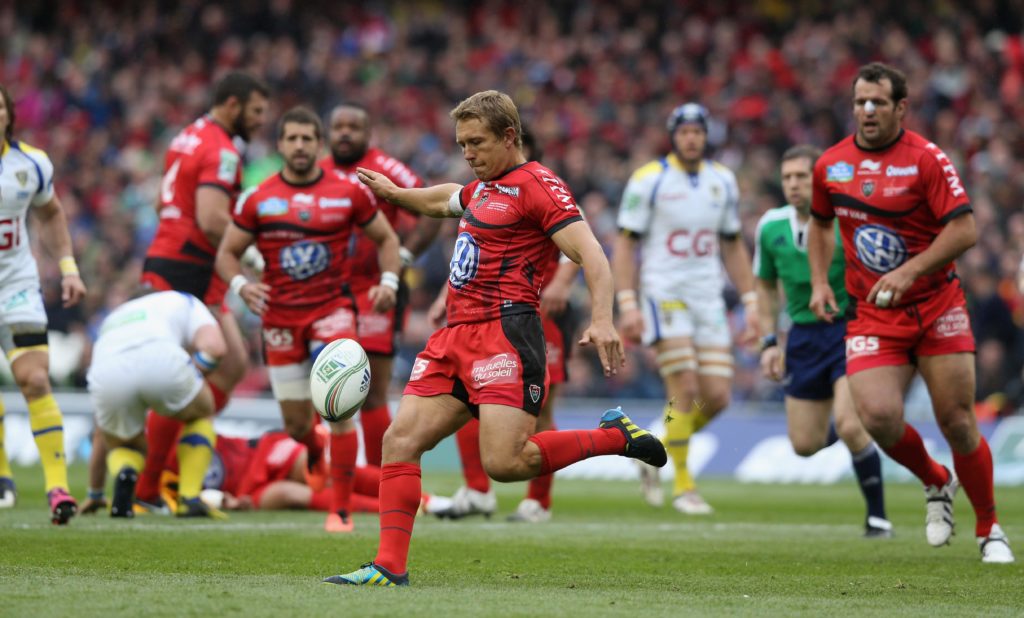Ali Williams played extensively with Dan Carter in the All Blacks between 2003 and 2012 and then spent three years with Jonny Wilkinson at Toulon.
His exposure to both men puts him in an almost unique place to compare and contrast the pair who are universally recognised as the best fly-halves to ever play the game.
XV: How did both men deal with pressure situations?
AW: You can sum it up really quickly. One was all about understanding and utilising and empowering the people alongside him when things got tricky. Taking away the natural, individual talent that Dan had, he was just a great human who could empower the team to turn around and get out of strife or whatever.
Jonny was the opposite. He would be like, ‘If we are in shit street, just give me the ball and I’ll kick us out of trouble. Give it to me and I’ll fix it’. At Toulon he had Mat Giteau outside him and we used to say, ‘Use him because we don’t play in this conservative mode’, because when there is an opportunity, there is an opportunity, but that wasn’t Jonny’s style. His style was very much ‘I’ll steer us around and when it gets hard, I’ll just keep kicking us down there and let’s make them make the mistakes’.

One put it all on his shoulders and the other one tried to empower the team. Both had their benefits, obviously.
And the bit I find really interesting is that one was so hyper concentrated. That was Jonny, and if you put pressure on him you could physically see it on him. The other was so relaxed you thought he’d fall asleep when it was super stressful.
I used to ask Dan ‘What’s going on?’, and he’d say ‘just relax mate, we are all right’. I genuinely don’t understand how Dan was so relaxed and so composed given the status of him in New Zealand and worldwide.
The number of people who knew Dan Carter around the world was unbelievable. He was the modern Jonah because he had that brand and he didn’t hide from being his own person.
Ali Williams
The number of people who knew Dan Carter around the world was unbelievable. He was the modern Jonah because he had that brand and he didn’t hide from being his own person. We had a lot of fun together.
Jonny and Dan were polar opposites, but both were amazing rugby players.
XV: How did they compare in terms of the way they played?
AW: If you talk about natural talent, they were both amazing tacklers. Jonny never shied away from any hard work in terms of tackling. He liked to put in big shots and he could really change a game with a tackle.
Whereas Dan would make the tackle and then try to change the game on the turnover. They had different ways of looking at the tackle, I think.

Jonny was a bloody good runner, but he probably didn’t back himself as much as Dan who had amazing strength. He had unbelievable strength from the hips so he could fend massive guys, or he could step you.
XV: How did they compare as people off the field?
AW: Jonny you would struggle to get a reply from when you texted him. But Dan would reply all the time and probably more so to his mates who weren’t on the rugby field. He looked after his mates out of rugby better than anyone I know and stayed connected to them. Every town we went to he would catch up with mates he knew.
Johnny, man, I had to prise him out to come and have a drink when we won the European Cup. They have very different make-ups but were as successful as one another.
XV: What marked these two as great in your opinion?
AW: The underlying thing about greatness is consistency and without doubt these two made an impact on the game every time they played. These guys were 10s so they were everywhere and they always touched the ball and their consistency was unbelievable.
Jonny was a bloody good runner, but he probably didn’t back himself as much as Dan who had amazing strength. He had unbelievable strength from the hips so he could fend massive guys, or he could step you.
Williams
You tell me a game where Dan didn’t play well or Jonny didn’t play well. Maybe there were games where they missed a few kicks but they always had an influence in some way and that’s what determines greatness.
There is consistency and there is the ability to stay in the game. Jonny shouldn’t have been walking half the time and I know the problems that Dan had. His calf, his back, his Achilles… all these things, but he was able to deal with that stuff.
My injuries really impacted me. I could have been so much better if I’d been able to train harder, but I couldn’t get through that element of whatever it was – my injuries compared with their injuries – and they still got through with theirs because they were so good every coach they had trusted them and gave them that week off or space they needed to help them.
You talk about the perfect 10, they both found a way.

XV: As a tight forward what did you particularly like about playing with these two?
AW: Where Dan goes, you win. It is that simple. Here is the thing that I would say, it is not just what he does on a rugby field because that is only 80 minutes in a week. It is what he does off the field.
Speak to Leon MacDonald and the impact Dan had last year on the Blues was astronomical and he didn’t even play. His professionalism, his manner, he just makes people look in the mirror. He doesn’t do anything half-arsed. Any time I played in with Dan I had a sense of confidence and it was the same with Jonny.
If it got ugly, they would know how to keep the forwards in the game. That’s the hard part for a 10… you have to ask how do we keep our forwards in the game, or how do we take them out of it if they are being smashed?
Forwards either win a game or lose a game so how do you move them around? They were both brilliant at knowing how to do that.



Comments
Join free and tell us what you really think!
Sign up for free